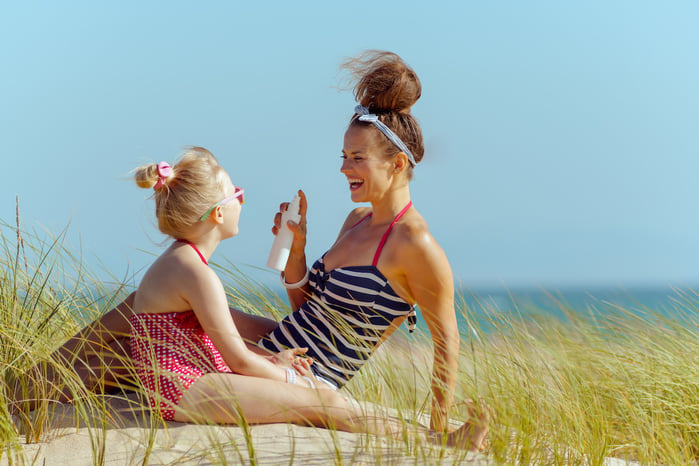
Everyone has heard that you need to wear sunscreen. The message has been delivered by just about every healthcare professional and cancer prevention organization out there. But recently there have been concerns raised about the safety of using sunscreen. Could sunscreen be bad for our health?
Is Sunscreen Safe?
According to the FDA, sunscreen is safe to use and has a benefit that outweighs risks. That benefit is preventing the development of life-threatening skin cancers. The only group of people who should not wear sunscreen when going outdoors is infants less than six months old, who should be protected from the sun by other means such as hats, clothing, or a screened buggy.
Even in Portland, where only 40% of our days are sunny in an average year, sunscreen is still important because the cancer-causing UV rays go straight through the clouds and into our skin.
The FDA has been urging manufacturers to do more research into how sunscreen may be absorbed through the skin to be sure that the ingredients are safe as well as the way the sunscreen is applied is safe (cream versus sprays, etc).
What Sunscreen Ingredients Should I Avoid?
Some sunscreens sold outside the US may contain PABA or trolamine salicylate. These ingredients are not considered safe by the FDA. If going abroad, consider buying a good supply of sunscreen before you leave. Other than that, most sunscreen ingredients are safe for most people. Things you should avoid:
- Products that combine sunscreen and DEET. DEET should not be reapplied as often as sunscreen. You should use separate sunscreen and bug repellent.
- For babies between 6 months and 2 years, you should use a non-chemical sunscreen based off of zinc oxide or titanium oxide. Chemical sunscreens can irritate a baby's skin.
- If sunscreen irritates your skin, then you may have to avoid certain ingredients. Non-chemical sunscreens are often the best in this case. If only certain brands have that effect you may be able to compare ingredients and isolate the specific problem.
- If you are going to be spending time near coral reefs, it may be better to use only mineralized (non-chemical) sunscreens. Hawaii is the first state to ban the sale of chemical sunscreens that contain oxybenzone and octinoxate. Both of these ingredients are believed to be bad for the health of the coral reefs. The law in Hawaii will take place January 1, 2021.
There is some controversy over whether the tiny particles in the spray sunscreens may be dangerous. In general, the chemicals in sunscreens are safe to use on your skin, but should not be inhaled. If you choose to use a sunscreen spray it’s best to do it outdoors and far away from others. Try to hold your breath or step away from the area where you sprayed after you’re done so that you don’t increase the amount that is inhaled.
Isn't Some Sun Exposure Good for Us?
Yes, some sun exposure is, indeed, good for us. And being in the northwest, you want to soak up some of those rays on the days we get it! That’s because the sun is your best source of vitamin D. More than 40% of American adults are deficient in Vitamin D and some people blame sunscreen for this deficiency.
If you are concerned about vitamin D levels, you could take a vitamin D supplement or eat more food fortified with vitamin D. Keep in mind that sunscreen is needed to block the ultraviolet light that causes cancer. You can still get benefits of sunlight exposure while wearing sunscreen.
What About Skin Cancer?
Direct sun exposure is the highest risk factor for skin cancer. Even people with darker skin can get skin cancer from extended exposure. The best way to avoid skin cancer is to wear broad-spectrum (UVA and UVB blocking) sunscreen any time you are outdoors. Wearing sunscreen is perfectly safe, and there are a variety of sunscreen formats available with different ingredients that you can choose from.
Other ways to lessen your risk of skin cancer and other types of cancer include:
- Wearing a hat with a wide brim
- Wearing UV-filtering sunglasses. Most prescription glasses also provide some sun protection.
- Using a lip balm with SPF in it.
- In intense sunlight or at altitude, consider wearing sun-protection clothing or at a minimum, darker colored clothes that make it harder for the rays to get through.
- Avoid scheduling outside activities between 10 am and 2 pm when the sun is most intense, especially in the summer months.
- Do regular inspections to look for changes to your skin, including moles changing shape or growing.
So this summer, don’t forget to use the sunscreen. The benefits outweigh the risks.

